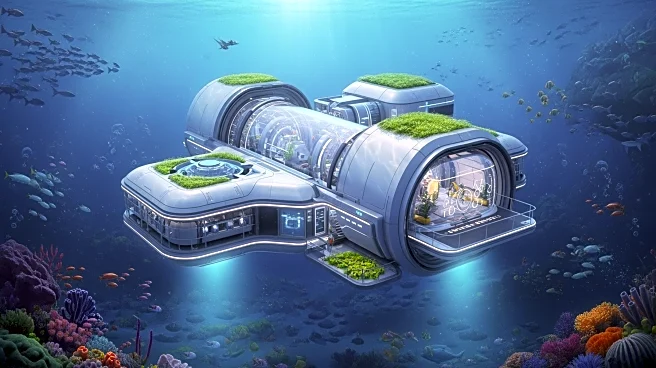What's Happening?
A company named DEEP, founded in the United Kingdom, has announced plans to deploy a new undersea habitat called Vanguard. This habitat is designed to accommodate a crew of four for extended periods, allowing them to live and work underwater without resurfacing.
The habitat, resembling a large yellow steel tank, is equipped with living quarters and workspaces, and features a moon pool for direct ocean access. DEEP aims to establish a permanent human presence underwater, enhancing research capabilities and productivity. The prototype is set to be deployed 60 feet below the surface at an undisclosed location by the end of the year.
Why It's Important?
The deployment of Vanguard represents a significant advancement in oceanic research, offering scientists the ability to conduct extended underwater studies. This could lead to accelerated data collection and potentially groundbreaking discoveries in marine biology and environmental science. The initiative also highlights the growing interest in private sector involvement in underwater exploration, similar to trends seen in space exploration. By providing a platform for continuous underwater habitation, DEEP could revolutionize how marine research is conducted, offering new opportunities for scientific and commercial endeavors.
What's Next?
DEEP plans to expand its operations by developing larger, modular habitats that can accommodate more people. The company envisions creating a community on the seabed, with up to 130 individuals living underwater by 2035. This ambitious plan will require strategic discussions and partnerships with various stakeholders, including governments and research institutions. The successful deployment and operation of Vanguard will be a critical first step in realizing this vision, potentially leading to increased investment and interest in undersea habitation technologies.
Beyond the Headlines
The initiative by DEEP raises ethical and environmental considerations regarding the impact of permanent human presence underwater. It prompts discussions on sustainable practices and the protection of marine ecosystems. Additionally, the project could influence cultural perceptions of ocean exploration, inspiring new narratives about human interaction with the sea. As technology advances, the concept of living underwater may shift from science fiction to a viable reality, challenging traditional views on habitation and resource utilization.
















